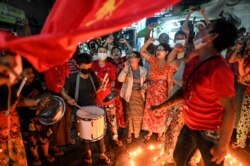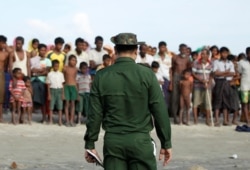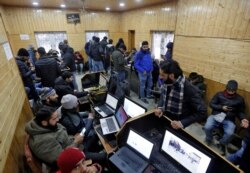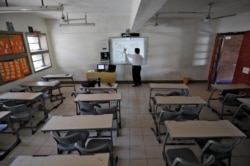On the morning of Myanmar’s military coup, Nyein Nyein, associate editor of Irrawaddy News, found herself alone in a virtual newsroom meeting.
“My colleagues were out of reach for like three or four hours when the military totally shut down not only the internet, but mobile services,” she said.
“We were having very early newsroom meetings on how we are going to report and then like, 7 a.m., they’re all gone.”
The internet blackout went into effect as the military moved to seize power and imposed a year-long state of emergency following months of tensions. The military has made allegations of election fraud over a November vote the National League for Democracy party won in a landslide victory.
Access to the internet has been intermittent in the past week, with certain apps and websites blocked, including Facebook, where citizens had been posting livestreams of protests.
The military announced Thursday access to the platform will be blocked until Sunday, citing the need to retain “stability.”
But internet blackouts in Myanmar are nothing new.
“There are a number of townships in the Rakhine and Chin states that have not had internet connection or have been throttled — reduced internet connection for a long time,” Irene Khan, the U.N. special rapporteur for freedom of expression, told VOA.
In 2017, Myanmar's military launched a violent crackdown against Rohingya Muslims in Rakhine state, prompting hundreds of thousands to flee across the border to Bangladesh.
Fighting between militant groups and Myanmar’s military spilled into neighboring Chin state, which is largely occupied by Christians.
The military said it was tackling militants and denied targeting civilians, but a UN report in 2018 said Myanmar’s actions were carried out with “genocidal intent.”
The offensive lead to internet cuts in both states, with the central government citing "security concerns.”
These kinds of internet cuts — regional and long-term — are not specific to Myanmar.
In 2019, the #KeepItOn campaign, hosted by organization Access Now, tracked 213 internet shutdowns across 33 countries. In recent months, blackouts have been tracked in Uganda, Ethiopia’s Tigray region, Belarus, and India, among others.
The blocks often accompany periods of turmoil including contested elections, protests, or civil unrest.
In Indian-controlled Kashmir, access to fast internet has been blocked since India revoked the contested region’s special status in 2019. India says the blocks are needed to fight extremism and false news, but journalists on the ground fear the cuts are meant to silence protesters and prevent the spread of information about atrocities.
"In Kashmir, whenever, even right now, if there is a gun battle in South Kashmir, the government will suspend internet of that area,” Syed Shahriyar, an independent journalist in Srinagar, told VOA.
When India revoked article 370, which granted the Muslim-majority state rights including its own constitution and laws, Delhi argued in part that the move was needed to bring stability to a region affected for decades by separatist fighting.
Government orders extending bans on high-speed internet in the region cited the need to protect public order and prevent “anti-national elements” from misusing data services.
Shahriyar said internet blackouts at that time were so widespread that journalists would travel by train, or even by plane to the Indian capital of Delhi, just to file their materials.
“I had a friend who was doing a story he used to go and come to and fro to Delhi once a day,” Shahriyar said.
“I don't know anywhere in the world this could have happened, people taking flights, journalists taking flights...just to tell the story of what is happening here.”
In addition to making the jobs of journalists more difficult, internet cuts prevent people from contacting friends and family and sharing information.
Felicia Anthonio of the #KeepItOn Campaign said that internet shutdowns are “weaponized” by governments to keep their populations confused.
“When you find yourself in a crisis, and you don't have access to information, you're not able to reach your family and friends. You are left in a state of confusion,” she said.
Particularly during a pandemic, people subjected to internet shutdowns are also losing access to a myriad of necessities. ATM and bank services were suspended in Myanmar when the military shut off services.
In Myanmar and India, journalists have noted that children who are relying on virtual education amid the pandemic are adversely affected.
The United Nations’ office of Human Rights has declared internet blackouts unlawful.
Khan doesn’t believe there is ever justification for a government to cut access to the internet. “I cannot think of a good reason,” she said. “In fact, that is why the Human Rights Council, which is made up of a large number of governments, have come to the conclusion that internet shutdowns of this type [of] blunt internet shutdowns are actually unlawful.”
The United Nations and organizations such as Access Now are hopeful that internet shutdowns will decrease as the international community continues to condemn them. Until then, journalists and activists say they are doing what they can to try to keep their communities and the outside world informed.
Moe Moe Htun and Jessica Jerreat contributed to this report.









